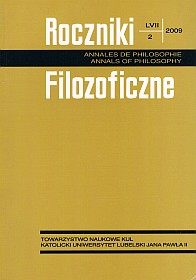Eppur si muove: The Legend of Galileo
Abstract
[Article translated by Zenon E. Roskal]
The legend of Galileo’s encounter with the Inquisition is one of the constitutive myths of modernity. That encounter is often seen as a prime example of the hostility between science and religion. This essay examines some of the events of the “Galileo Affair” in order to show how misunderstandings of what occurred in the 17th Century continue to have currency. In particular, Galileo did not demonstrate that the Earth moved; he did not think that his astronomical observations were sufficient to constitute such a proof. Both he and his opponents in the Inquisition accepted the prevailing Aristotelian conception of what a demonstration in science consisted. However misguided, the Inquisition’s actions were disciplinary not doctrinal. In ordering Galileo not to defend the view that the Earth moved, the Inquisition subordinated the interpretation of the Bible to geocentric astronomy. The “legend of Galileo” continues to be used as an ideological weapon in contemporary cultural debates, including discourse about the relationship between faith and reason, the Bible and science.
Information about Translator: Associate Professor Zenon E. Roskal: Chair of Philosophy of Inanimate Nature, Faculty of Phlosophy, John Paul II Catholic University of Lublin
References
Beretta F.: Galilée devant le Tribunal de l’Inquisition. Une relecteur des sources, Fribourg, Suisse, 1998.
Beretta F.: Galilée en procès, Galilée réhabilité?, Éditions Saint-Augustin 2005.
Blackwell R. J.: Behind the Scenes at Galileo’s Trial, Notre Dame, IN: University of Notre Dame Press 2006.
Camerota M.: Galileo Galilei e la cultura scientifica nell’età della controriforma, Roma: Salerno Editrice 2004.
Carroll W. E.: Galileo and Biblical Exegesis, [w:] Largo campo di filosofare: Eurosymposium Galileo 2001, ed. J. Montesinos and C. Solís, Orotava, España: Fundación Canaria Orotava de Historia de la Ciencia 2001, s. 677-691.
Carroll W. E.: Galileo and the Myth of Heterodoxy, [w:] Heterodoxy in Early Modern Science and Religion, ed. I. Maclean, J. Brooke, Oxford University Press, 2005, s. 115-144.
Carroll W. E.: Galileo: Science and Faith, London: CTS 2009.
Fantoli A.: Galileo: Per il Copernicanesimo e per la Chiesa, Vatican City: Specola Vaticana 1993.
Finocchiaro M. (ed.): The Galileo Affair: A Documentary History, Berkeley, CA: The University of California Press 1989.
Galileo Galilei: Lettera a Cristina di Lorena : sull’uso della Bibbia nelle argomentazioni scientifiche, a cura di F. Motta, introduzione di M. Pesce, Genova: Casa Editrice Marietti 2000 (najlepsze tłumaczenie angielskie: Letter to the Grand Duchess Christina (1615), [w:] Finocchiaro M. (ed.): The Galileo Affair: A Documentary History, Berkeley, CA: The University of California Press 1989, s. 87-118).
Galileo Galilei: Sidereus Nuncius or The Sidereal Messenger, Transl. with an Introduction, Conclusion, and Notes by A. Van Helden, Chicago: The University of Chicago Press 1989.
McMullin E. (ed.), The Church and Galileo, Notre Dame, IN: The University of Notre Dame Press 2005.
McMullin E. (ed.), Quoting Feyerabend on Galileo, „Irish Theological Quarterly” 73 (2008), s. 164-173.
Pagano S. M., Luciani A. G. (eds.), I documenti del processo Galilei, Vatican City: Libreria Vaticana 1984.
Redondi P.: Dietro l’immagine. Rappresentazioni di Galileo nella cultura positivistica, „Nuncius” 9 (1994), fasc. 1, s. 65-116.
Remmert V.: In the Service of the Reich: Aspects of Copernicus and Galileo in Nazi Germany’s Historiographical and Political Discourse, „Science in Context” 14 (2001), No. 3, s. 333-359.
Segre M.: The Never-Ending Galileo Story, [w:] The Cambridge Companion to Galileo, ed. P. Machamer, Cambridge, UK: Cambridge University Press 1998, s. 388-416.
Shea W., Artigas M.: Galileo in Rome, Oxford: Oxford University Press 2003.
Speller J.: Galileo’s Inquisition Trial Revisited, Frankfurt: Peter Lang 2008.
Wallace W. A.: Galileo and Aristotle in the “Dialogo”, „Angelicum” 60 (1983), s. 311-332.
Wallace W. A.: Galileo and His Sources, Princeton, NJ: Princeton University Press 1984.
White A. D.: A History of the Warfare of Science with Theology in Christendom, 2 vols., Buffalo, NY: Prometheus Books 1993.
Copyright (c) 2009 Roczniki Filozoficzne

This work is licensed under a Creative Commons Attribution-NonCommercial-NoDerivatives 4.0 International License.





